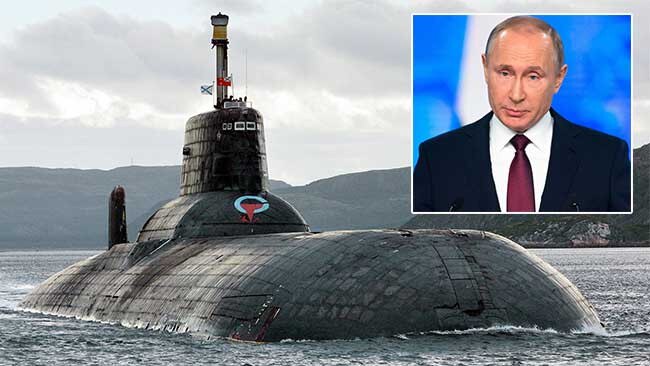Vladimir Putin threatens to target US with nuclear missiles
Russia’s President vows to target Washington with nuclear missiles in dramatic escalation of tensions between super powers.

President Putin has vowed to target the United States if American missiles are deployed to Europe after the collapse of a key arms treaty between Moscow and Washington.
Speaking during his annual state of the nation address, Mr Putin said that if US missiles that could “reach Moscow within 10 to 12 minutes” were placed in Europe, then the Kremlin would be “required to envisage both mirrored and asymmetric responses”.
He added: “Russia will be forced to create and deploy types of weapons that can be used not only in respect of those territories from which the direct threat to us originates, but also in respect of those territories where the centres of decision-making are located.”
Mr Putin, 66, made clear that the Kremlin would deploy weapons capable of hitting US targets before any missiles reached Russia from European launch sites.
It was the harshest rhetoric from the Kremlin since President Trump pulled out of the Intermediate-range Nuclear Forces arms treaty on February 1, accusing the Russians of testing and deploying a prohibited cruise missile.
Jens Stoltenberg, the NATO secretary-general, insisted last week that “we do not intend to deploy new ground-based nuclear missiles in Europe”.
However, Russia fears that conventional weapons that have enough yield, explosive power and accuracy to threaten its silos could be positioned on the continent.
Mr Putin said he did not want confrontation but that some of America’s ruling class were “overly enthralled with the idea of their superiority over the rest of the world”. He said: “Do they know how to count? They probably do. Let them calculate the range and speed of our advanced weapons systems. Only then should they take decisions that could create extra serious threats to our country, and that would, of course, lead to a response from Russia.”
Cedric Leighton, a retired intelligence officer and US air force colonel, told CNN: “This is shades of the Cold War all over again. We’re dealing with something very serious that’s really upping the ante when it comes to not only a possible arms race, but also the future of US-Russian relations.”
The US State Department said: “President Putin’s remarks are a continuation of Russia’s propaganda effort to avoid responsibility for Russia’s actions in violation of the INF treaty. In contrast to Russia’s efforts to create many new weapons systems, including non-strategic nuclear weapons, the United States is in full compliance with the treaty.”
Vladimir Shamanov, chairman of the defence committee in Russia’s lower house of parliament, said that NATO headquarters in Brussels and the command posts of defence ministries in the alliance’s member states could become targets of Russian missiles in case of a US missile deployment to Europe.
Russia and the US already have nuclear intercontinental ballistic missiles (ICBMs) aimed at each other, but any missile fired from Russian territory would not be able to hit the US before a missile launched from Europe reached Russia. That would require a faster weapon or one located closer to the US.
Mr Putin did not say what in Russia’s growing armoury was capable of that. However, he said that a series of new weapons that he unveiled last year were advancing in development. They include the Poseidon underwater drone, the Kinzhal hypersonic air-launched missile, and the Avangard “hypersonic glide vehicle”, all nuclear-capable.
James Cameron, a research associate in the department of war studies at King’s College London, said that Mr Putin wanted to indicate that any attack on Russia from Europe would trigger a global war. “You cannot assume the response would be limited to Europe,” he said.
The Kremlin was concerned about Washington’s development of a low-yield nuclear warhead for its Trident missiles and Mr Putin wanted to “push back at the idea of a limited nuclear conflict”, Dr Cameron added.
Mr Putin’s comments came towards the end of an address that had focused on domestic issues as he faces declining public trust over unpopular government reforms. He announced lower mortgage rates, and tax breaks for large families, and said that the government would nearly double benefits for disabled children. He also promised improved technology in schools and better access to medical services in the countryside, and pledged one trillion roubles (pounds 11.7 billion) to fighting cancer over the next six years.
Mr Putin’s image has taken a beating in recent months over unpopular reforms to increase the pension age and to raise value added tax at a time when household incomes are falling. A survey by a Russian state polling agency last month found that public trust in Mr Putin had fallen to 33.4 per cent, its lowest since 2006, and less than half what it was in 2015 after Russia’s annexation of Crimea the previous year.
The Times




